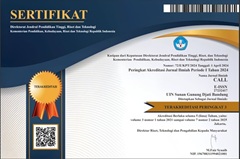Building Children Character Through Moral Values in The Adventure of Pinocchio
DOI:
https://doi.org/10.15575/call.v3i2.14854Abstract
This study attempts to analyze a fairy tale novel entitled “The Adventure of Pinocchioâ€, which talks about the story of the irrepressible marionette who longed to become a real boy. This study focuses on revealing the categories of moral value and describing the building children's character implied in this novel. To analyze this novel, the researcher uses two principles theory to find out the objectives of the studies. There are moral values argued by Linda & Eyre and the theory of children’s character building based on Lewis. The method of this study is qualitative research, which means it does not need statistical procedure to analyze the material. This study merely uses “The Adventure of Pinocchio,†a novel by Carlo Collodi, translated into English version by Carol Della Chiesa as the primary data source. At the same time, the secondary data sources are taken from other literary books and related references to support and complete the primary data. As a result, the researcher finds that some elements of moral values such as love and affection, sensitivity and not-selfish, bravery, self-discipline, and moderation occurred in the content of the novel. Meanwhile, building children's character can be implied through “The Adventure of Pinocchio's†fairy tale: honesty, responsible, regard, respect, and compassionated.
Â
Keywords: Fairy Tale, Moral Value, Building Children Character
References
Abrams, M. H. (1999). A Glossary of Literary Terms. United States of America: Thomson Learning.
Ingpen, Robert. (2014). The Adventure of Pinocchio. UK: Templar Publishing.
Chiesa, D. Carol. (1926). The Adventure of Pinocchio.
Forster, E.M. (2002). The aspect of the novel. New York: RosettaBooks LLC.
Hurlock, Elizabeth. (1987). Moral Development. Mc Graw: Hill Book Company.
Lewis, Barbara. (2004). Karakter Building untuk Remaja. Batam: Kharisma Publishing Group.
Linda and Richard Eyre. 1997. Teaching Your Children Value. New York: Fireside Rockfeller Center.
Seetha Kunchitapadam, Need for Value-Based Spiritual Education In School, P.71 (On-Line), available on https://www.sciencedirect.com/journal/ ...journal...education.pdf, (February 26th, 2018)
Tarigan, H. G. (1995). Dasar-dasar Psikosastra. Bandung: Angkasa.
Turiel, Elliot. (2002). The Culture of Morality (Social Development, Context, and Conflict). USA: Cambridge University Press
Ulfah Maria. (2012). The Unconditional Love Portrayed in Carlo Collodi’s Novel, The Adventures of Pinocchio. Published Thesis. Semarang: Semarang State University
Wellek, R. & Warren, A. (1962). Theory of Literature. London. Harcourt, Brace World, Inc.
Downloads
Published
Issue
Section
Citation Check
License
Authors who publish in CALL agree to the following terms:
- Authors retain copyright and grant the journal right of first publication with the work simultaneously licensed under Attribution-ShareAlike 4.0 International (CC BY-SA 4.0) License that allows others to share the work with an acknowledgment of the work's authorship and initial publication in this journal.
- Authors are able to enter into separate, additional contractual arrangements for the non-exclusive distribution of the journal's published version of the work (e.g., post it to an institutional repository or publish it in a book), with an acknowledgment of its initial publication in this journal.
- Authors are permitted and encouraged to post their work online (e.g., in institutional repositories or on their website) prior to and during the submission process, as it can lead to productive exchanges, as well as earlier and greater citation of published work (See The Effect of Open Access).




